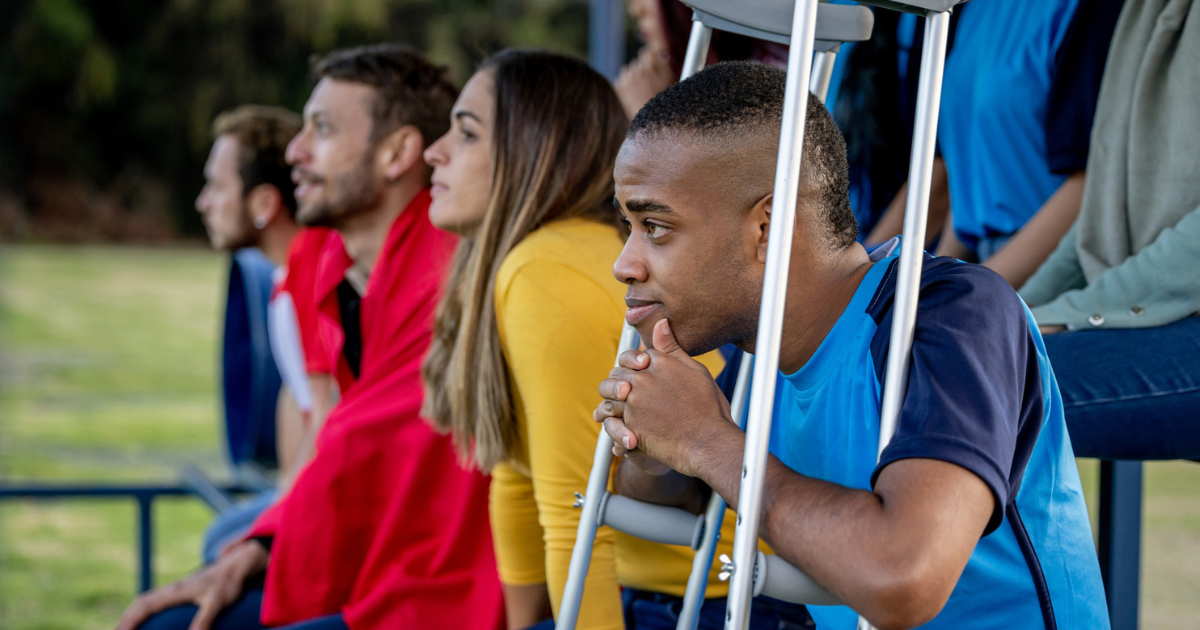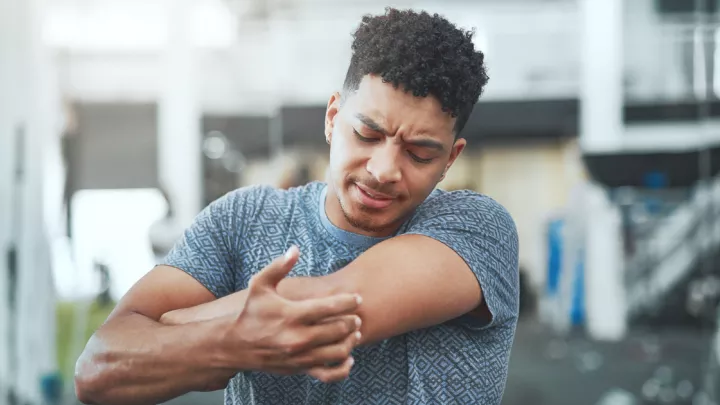How can a sports injury affect mental health?

Sports injuries are an inevitable part of athletics, whether they are minor sprains or major injuries requiring surgery. While the physical aspect of recovery often receives the most attention, the mental and emotional toll can be equally significant.
As a college baseball player, clinical psychologist Andrew Ahrendt, PhD, experienced firsthand the highs and lows of sports injuries. Following shoulder surgery, he was motivated to pursue a career in helping others return to competition. He is part of the Nebraska Medicine Sports Medicine team and the sports psychologist for Union Omaha.
“Sports injuries can impact the mental health of athletes at any level,” Dr. Ahrendt says. “But the more your identity is tied to being an athlete, the greater the impact. Suddenly, you feel like you’re no longer whole.”
Recovering fully from sports injuries includes dealing with their mental health effects. In this article, we explore these effects and provide tips for a smoother recovery process.
Common responses
The psychological responses to sports injuries can vary greatly. However, some common reactions include:
- Depression: Injuries can lead to feelings of sadness and hopelessness, especially if the injury sidelines the athlete for an extended period.
- Anxiety and fear: Anxiety and fear of reinjury can significantly affect an athlete's mental well-being and overall recovery process and can even increase the chance of reinjury.
- Lack of motivation: The prospect of a lengthy recovery can demotivate athletes, making it challenging for them to stay committed to their rehabilitation.
- Identity crisis: Many athletes' identity is closely tied to being an athlete. When faced with a sports injury, they may experience a loss of identity and struggle with feelings of self-doubt and frustration.
- Overconfidence: Some athletes may not realize how serious their injury is and try to go back to their sport too soon. This can make the injury worse.
Extra challenges
For young athletes, injuries can be especially hard to cope with, as this might be their first serious obstacle in life, says orthopaedic surgeon Matthew Tao, MD.
“My heart especially goes out to the high school and college kids,” Dr. Tao says. “I tell them, regardless of whether you're a young kid or a professional athlete, everybody goes through the mental ups and downs of dealing with an injury, particularly if you need surgery or it's a long recovery.”
Tips for coping
Acknowledging that it is normal to struggle and seeking support can help athletes cope with the stress and anxiety that accompany injuries, Dr. Ahrendt says.
“Even though injuries can make people feel powerless, the way you get that power back is to accept the negative feelings and then find ways to effectively cope with them,” he says.
To better cope with a sports injury, Dr. Ahrendt suggests the following strategies:
- Setting goals: Establishing process and outcome goals can provide direction, motivation and purpose during recovery.
- Communicating openly: Sharing feelings and concerns with coaches, medical teams, family and friends can lessen emotional burdens.
- Being present: Focusing on the present moment can prevent athletes from becoming overwhelmed by the recovery timeline.
- Controlling the controllable: Concentrating on aspects within their control, such as following the rehabilitation plan, can help athletes feel more empowered.
- Remaining an active teammate: Even if an athlete can’t play their sport, they can contribute to the team in other ways, like attending or helping at practices and supporting their teammates in games.
Mental training strategies
Fear of reinjury, loss of confidence and anxiety about performance are common issues that can impede recovery and return to a high level of play. Dr. Ahrendt uses tailored mental training strategies to address these concerns, enabling athletes to rebuild their mental resilience and return to competition with a renewed mindset.
“We use a range of techniques to support athletes during their recovery to reframe negative thoughts and develop a more positive and objective outlook,” Dr. Ahrendt says. “Additionally, skills like visualization and mental imagery allow athletes to mentally rehearse their sport and prepare for their return.”
Incorporating these strategies into the rehabilitation process has significantly improved outcomes for injured athletes. Studies indicate that mental training and physical therapy help athletes regain confidence and reduce anxiety after an injury.
“Continuing to use these strategies and working with a sports psychologist has been found to further improve athlete performance,” Dr. Ahrendt says. “So, these strategies not only help athletes build confidence during their recovery but can be used to further enhance their quality of play once they have healed and returned to play.”
Working with a sports psychologist benefits not only the athlete themselves, but the team as a whole. Teams can create a more supportive culture by promoting both mental and physical health. This helps in quicker recovery and enhances long-term well-being, making the athlete more resilient to future challenges on and off the field.
A team effort
A multidisciplinary approach involving mental health professionals alongside physical therapists, trainers and physicians can be highly beneficial.
The Nebraska Medicine Sports Medicine team includes specialists from:
- Primary care sports medicine
- Orthopaedic surgery
- Physical therapy
- Athletic training
- Behavioral health
Remember, with the proper support and strategies, athletes can navigate the challenges of injury recovery and emerge more robust both mentally and physically.
“We want you to succeed,” Dr. Tao says. “When you step back onto the field or return to activity, we want you to be physically and mentally ready to be at your best.”







